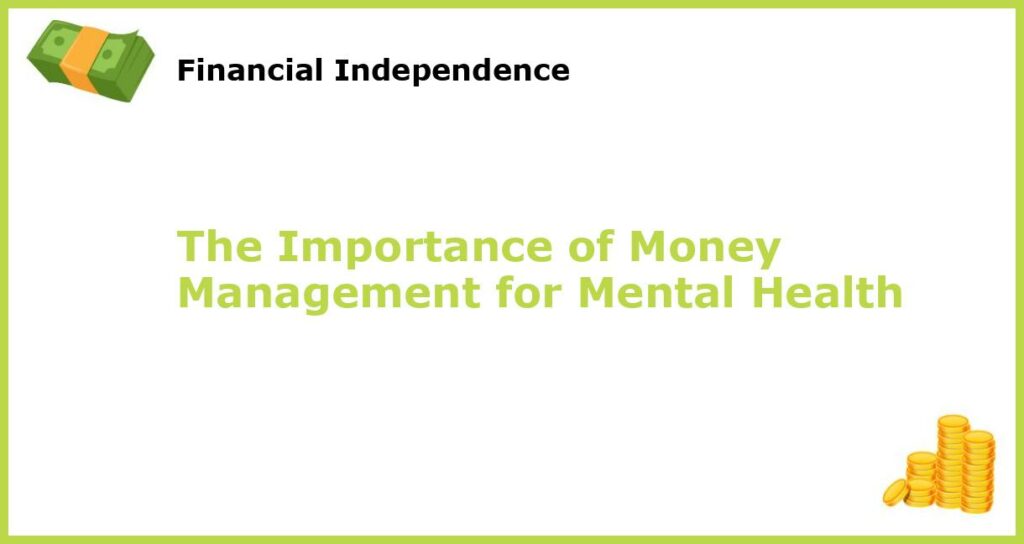Money may not buy happiness, but the lack of it can lead to a great deal of stress and anxiety. In today’s fast-paced world, people are often struggling to make ends meet and manage their finances effectively. The pressures of financial stress can have a severe impact on a person’s mental health, leading to anxiety, depression, and even panic attacks. Money management plays an essential role in mental health, and learning how to manage your money effectively can help you alleviate some of the stress and anxiety that comes with financial uncertainty.
The Relationship Between Money and Mental Health

The relationship between money and mental health is intricate and complex. Financial stress can have a severe impact on a person’s emotional well-being. It can lead to depression, anxiety, and even physical symptoms such as gastrointestinal issues and headaches. It can also affect relationships, impact work performance, and lead to feelings of hopelessness and despair. By learning how to manage your finances, you can alleviate some of the stress and anxiety that comes with financial uncertainty.
The Benefits of Mindful Spending

Mindful spending is the act of being conscious of where your money is going and how it affects your overall financial health. It involves evaluating your spending habits and focusing on what matters most to you. By practicing mindful spending, you can avoid impulse purchases and focus on investing in experiences that promote your well-being, such as joining a yoga class or going on a weekend getaway. This can help you achieve a sense of financial confidence and improve your mental health.
How Money Management Can Reduce Stress

The pressures of financial stress can take a toll on both your physical and mental health. A lack of control over your finances can lead to feelings of anxiety, tension, and even physical symptoms such as headaches and fatigue. One of the best ways to reduce the amount of financial stress you experience is by practicing good money management habits. This may include setting aside money in an emergency fund, paying off debt, or creating a budget. Having a plan in place can help alleviate the stress that comes with financial uncertainty.
The Importance of Saving for the Future

One of the essential aspects of good money management is saving for the future. Saving money allows you to plan for the future and reduce the amount of financial stress you experience in the present. Investing in assets that appreciate over time or setting aside money for retirement can create a sense of financial security and provide peace of mind. This can significantly improve your mental health in the long term.
The Connection Between Financial Goals and Mental Health

Setting financial goals can help you improve your mental health and achieve financial stability. When you have clear financial goals in mind, you can feel a sense of purpose and accomplishment when you accomplish them. This can boost your self-esteem and help relieve anxiety and depression. Financial goals that are realistic, achievable, and measurable can help you develop a healthy relationship with money and improve your overall financial health.
The Dangers of Overspending
Overspending is a significant problem that can cause a lot of financial stress and lead to mental health issues such as anxiety and depression. Overspending can lead to living beyond your means and affect your ability to meet essential needs. To avoid falling into the trap of overspending, you need to reevaluate your priorities and make changes to your lifestyle. This could involve focusing on needs rather than wants, creating a budget, and seeking professional financial advice.
How Budgeting Can Improve Your Mental Health
A crucial aspect of good money management is creating a budget. By knowing where your money is going, you can avoid overspending and ensure essential needs are met. Budgeting can also help you identify areas where you can cut back on spending, freeing up money for other aspects of your life that promote well-being. Creating a budget can help you develop positive money habits and promote financial stability and mental health.
The Importance of Seeking Help When Needed
Financial stress can be overwhelming, and it’s essential to seek help when needed. Many resources are available to help you manage your finances and reduce the amount of financial stress you experience. Seek advice from a financial advisor, trusted friend or family member, or mental health professional. By taking the necessary steps to get help, you can alleviate some of the stress and anxiety that comes with financial uncertainty.
How Financial Stability Can Boost Your Mental Health
Financial stability is vital for achieving good mental health. Knowing where your money is going and having a stable source of income can create a sense of security and peace of mind. Financial stability can provide the freedom to pursue activities and experiences that promote well-being without worrying about the financial consequences. Creating a budget, setting financial goals, and investing wisely can help you achieve financial stability and improve your mental health in the long term.
The Importance of Being Proactive About Your Finances
The key to good money management is being proactive. Learning how to manage your finances effectively involves evaluating your spending habits, setting financial goals, and creating a budget. By taking control of your finances, you can avoid many of the pitfalls that come with financial stress. Being proactive about your finances can help you develop positive money habits and promote financial stability and overall well-being.







